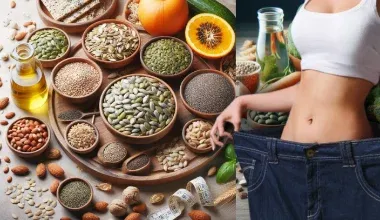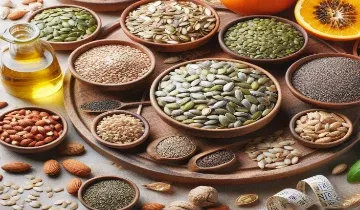Weight Loss: Leverage the Power of 5 Seeds for Sustainable Fat Loss
Incorporating a variety of nutrient-dense whole foods is a cornerstone of successful weight management. Seeds, often relegated to culinary afterthoughts, have emerged as powerful allies in the fight against excess body fat.
 |
| Leverage the Power of 5 Seeds for Sustainable Fat Loss |
Weight Loss: Leverage the Power of 5 Seeds
This article explores the scientific rationale behind the weight-loss benefits of seeds and introduces five readily available varieties that can be seamlessly integrated into your diet.
The Science of Seeds for Weight Loss:
Seeds exert their influence on weight loss through several key mechanisms:
Dietary Fiber: Seeds are exceptional sources of dietary fiber, a crucial component for promoting satiety and gut health. Fiber slows down digestion, keeping you feeling fuller for longer, and reducing overall calorie intake [1].
Protein Content: Many seeds boast a significant protein content. Protein is well-established for its ability to enhance satiety and promote muscle growth, which in turn elevates metabolism and calorie expenditure [2].
Healthy Fats: Unlike unhealthy fats that contribute to weight gain, seeds are abundant in healthy fats, particularly polyunsaturated fats. These fats promote feelings of fullness and regulate blood sugar levels, preventing energy crashes that often lead to unhealthy snacking [3].
 |
| Leverage the Power of 5 Seeds for Sustainable Fat Loss |
Top 5 Seeds for Sustainable Fat Loss:
1. Chia Seeds: Salvia Hispanica, commonly known as chia seeds, are nutritional powerhouses. They possess the remarkable ability to absorb large amounts of liquid, expanding in your stomach and promoting satiety. Additionally, chia seeds are rich in omega-3 fatty acids, essential for overall well-being and brain function [4].
Incorporation: Ground or whole chia seeds can be sprinkled on yogurt, or oatmeal, or incorporated into smoothies for a satisfying and nutrient-dense addition. Chia pudding is a popular breakfast option made with chia seeds soaked in milk or plant-based milk overnight.
2. Flax Seeds: Linum usitatissimum, or flax seeds, are another excellent source of dietary fiber. Flaxseed is also rich in lignans, plant compounds with potential health benefits such as reducing inflammation and supporting hormonal balance [5]. Ground flaxseed is particularly beneficial as it allows for better nutrient absorption. Flax seeds contribute to digestive regularity and promote feelings of fullness [6].
Incorporation: Grind flax seeds immediately before consumption for optimal nutrient absorption. Incorporate them into smoothies, yogurt parfaits, or even baked goods for a subtle nutty flavor and added fiber. Flaxseed meal can also be used as an egg substitute in vegan baking.
3. Pumpkin Seeds (Pepitas): Cucurbita pepo, commonly known as pumpkin seeds, are a treasure trove of zinc, a mineral with a demonstrated role in regulating appetite hormones. Pumpkin seeds are also a valuable source of protein and healthy fats, making them a satiating and metabolism-boosting snack [7].
Incorporation: Enjoy pumpkin seeds raw, roasted with your favorite spices, or incorporated into salads, soups, or stir-fries for a satisfying textural and nutritional element. Pepitas can also be blended into pestos or homemade nut butter for a unique and nutritious flavor profile.
4. Sunflower Seeds: Helianthus annuus, or sunflower seeds, are a good source of healthy fats that contribute to blood sugar regulation and satiety. Additionally, sunflower seeds are rich in vitamin E, a potent antioxidant that protects your cells from damage [8].
Incorporation: Snack on raw or dry-roasted sunflower seeds for a convenient and healthy option. They can also be added to salads, and yogurt parfaits, or incorporated into homemade trail mix for a portable and nutritious snack. Be mindful to choose raw or dry-roasted varieties over processed, oil-laden options. Sprouted sunflower seeds offer additional nutritional benefits and a slightly different taste and texture.
5. Sesame Seeds: Sesamum indicum, or sesame seeds, are tiny nutritional powerhouses packed with protein, fiber, and healthy fats. Sesame seeds may also play a role in regulating blood sugar, potentially reducing cravings [9]. Sesame seeds are a good source of calcium, which is essential for bone health and muscle function.
Incorporation: Sprinkle sesame seeds on stir-fries, salads, or roasted vegetables for a delightful nutty flavor and added nutritional value. Tahini, a paste made from sesame seeds, can be used as a healthy and flavorful component in dressings, dips, or sauces. Sesame oil, while not as nutrient-dense as whole sesame seeds, can add a distinct flavor to stir-fries and marinades.
Maximizing the Benefits of Seeds:
Gradual Introduction: Begin by incorporating small amounts of seeds into your meals and snacks, allowing your body to adjust to the increased fiber intake. This can help avoid bloating or digestive discomfort.
Embrace Variety: Experiment with all five seeds to not only enjoy a wider range of flavors but also benefit from the diverse nutrient profiles they
